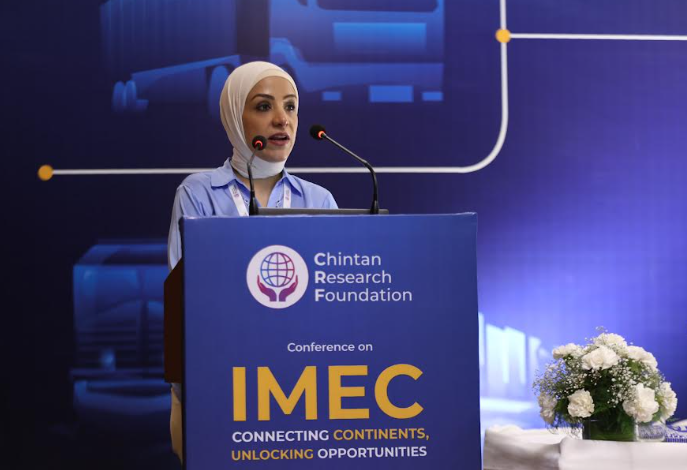
At the recent India-Middle East-Europe Economic Corridor (IMEC) Conference organised by the Chintan Research Foundation in New Delhi, Professor (Dr.) Hebatallah Adam—Professor of Economics, Academic Dean at the Jindal School of International Affairs, and Founder & Director of the Jindal Centre for the Global South, offered a thought-provoking intervention that went beyond reiterating the promises of IMEC, engaging instead in a critical examination of its conceptual underpinnings and structural viability. She did not dwell on reiterating the well-known facts surrounding IMEC’s origins; rather, she engaged deeply with the corridor’s strategic promise, its glaring vulnerabilities, and most importantly, its need for recalibration.
IMEC, she noted, is more than a logistics corridor: it is a geopolitical response, “the West’s geoeconomic answer to the Belt and Road Initiative,” and must be assessed as such.
While the proposed benefits of IMEC include a reduction of time by 40% and logistics costs by 30%, Professor Adam cautioned against taking these figures at face value. She emphasised that “these numbers mask a far more intricate and complex reality.” Among the advantages often attributed to the corridor are enhanced export competitiveness for India, diversification of trade routes, strengthened trilateral cooperation among India, the Gulf, and Europe, and the opening of new employment and economic vistas. Yet, as she rightly pointed out, these remain contingent upon IMEC’s ability to navigate a web of operational, geopolitical, and infrastructural obstacles.
The most pressing of these, she argued, is the logistical complexity of the northern corridor that passes through Saudi Arabia, Jordan, and Israel. The reliance on three transshipments (ship-to-rail-to-ship) within politically sensitive regions introduces inefficiencies and vulnerability to delays. “Rail freight is already approximately 300% more expensive than sea freight,” she noted, underlining the cost-intensive nature of the current design.
In addition, the absence of formal customs and security agreements—particularly between Saudi Arabia and Israel—leaves the corridor open to diplomatic deadlocks. The reality of conflict and unrest in the region cannot be ignored. From the ongoing Israel-Gaza conflict to Iranian proxy threats and the Houthi disruptions in the Red Sea, the corridor traverses what she called “politically fragile zones.” These, she said, “proved how quickly regional unrest can cripple trade infrastructure.”
Perhaps most striking was her observation regarding Haifa Port—a key node in the proposed corridor, which is managed by the Shanghai International Port Group. “It is ironic,” she stated, “that a critical node in this Western-backed corridor is operated by a Chinese company,” raising fundamental concerns about IMEC’s ability to achieve the strategic autonomy it ostensibly seeks.
Financial and logistical feasibility, too, remains a significant hurdle. While commitments totalling $20 billion from the UAE and Saudi Arabia have been made, there is “limited clarity on actual follow-through.” Infrastructure costs—estimated at $3–8 billion per desert segment—are compounded by operational uncertainties. In a striking comparison, she pointed out that “India currently produces only 30,000 shipping containers annually, compared to China’s 3 million,” highlighting the challenges of domestic capacity constraints. “If China restricts supply, this will severely hamper IMEC’s implementation,” she warned.
Against this backdrop, Professor Adam offered a compelling alternative: a strategic recalibration of IMEC’s structure through the inclusion of Egypt. She built a powerful case for Egypt’s integration, not just as a supportive actor but as a pivotal force in reshaping the corridor’s trajectory.
“Egypt is a time-tested partner for both India and the Gulf,” she said, praising its geopolitical stability and diplomatic neutrality. More significantly, Egypt controls the Suez Canal, through which 12% of global trade and 30% of global container movement already pass. Rather than being bypassed, she argued, the Suez should be seen as an essential partner in the IMEC framework.
The infrastructure supporting this proposal is already taking shape. Egypt’s Suez Canal Economic Zone has seen heavy investment, including six active ports and four industrial zones focused on future-ready sectors such as green hydrogen, LNG, and shipbuilding. Its digitalised logistics ecosystem offers exactly the kind of stability and scalability that IMEC needs. The newly completed high-speed rail link between Ras Al-Khair and Sharm el-Sheikh, which connects directly to Egypt’s national rail and Mediterranean ports, further strengthens the viability of this proposal.
She proposed a rerouted IMEC that would follow the path: Mumbai → UAE → Saudi Arabia → Egypt (via rail) → Europe, effectively eliminating the politically sensitive Jordan-Israel segment and minimising transshipments. The advantages of this design are numerous, including increased efficiency, risk reduction, and access to established infrastructure.
Expanding on the opportunity to integrate Africa into this vision, Professor Adam underlined Egypt’s strategic position as a gateway to the continent. With direct highway connections to the Cairo–Cape Town and Cairo–Dakar corridors, Egypt could serve as a launchpad for broader South-South trade. IMEC, she declared, has the potential not only to span Asia and Europe but also to touch Africa and even Latin America, becoming a truly intercontinental corridor.
Professor Adam also advocated for a hybrid model—IMEC in conjunction with the Suez Canal—where the Suez would handle bulk commodities like oil and grain, while IMEC would focus on high-value, time-sensitive goods like pharmaceuticals, electronics, and hydrogen. “Let us not view the Suez Canal as IMEC’s competitor—but rather, as its most strategic ally,” she asserted. “Unlocking IMEC’s true potential does not lie in bypassing Egypt, but in embracing it.”
Leave a Reply